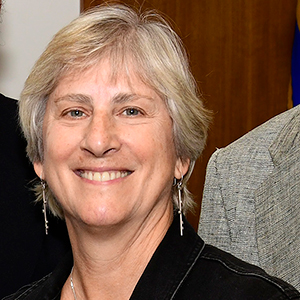NIEHS researchers have developed a new breast cancer risk score that improves the ability of scientists and physicians to identify women who will develop the disease. The risk score is based on a naturally occurring chemical modification to DNA known as methylation, which can be measured in the cells collected from a blood sample. The scientists’ new approach outperforms traditional breast cancer risk factors, such as a woman’s lifestyle and reproductive history. It also is as predictive as the risk captured by genetic scores based on a woman’s DNA sequence.
 Kresovich said this research is an important proof of principle study. (Photo courtesy of Steve McCaw / NIEHS)
Kresovich said this research is an important proof of principle study. (Photo courtesy of Steve McCaw / NIEHS)Adding the methylation-based risk score to risk information from other sources significantly improved breast cancer prediction, according to lead author Jacob Kresovich, Ph.D. He is an Intramural Research Training Award (IRTA) Fellow in the NIEHS Molecular and Genetic Epidemiology Group, which is led by Jack Taylor, M.D., Ph.D., corresponding author.
'Our risk score appears to be another step forward in our ability to identify women who are more likely to be diagnosed with breast cancer sometime in the future,' said Kresovich.
Using Sister Study data
Existing methods for assessing breast cancer risk include self-reported information, such as a woman’s age and family history of breast cancer, and newer risk scores based on genetic sequence, also known as polygenic risk scores. A growing body of literature suggests that DNA methylation profiles are associated with breast cancer incidence, but this information has yet to be incorporated into models designed to assess breast cancer risk. The research team set out to determine whether DNA methylation profiles could improve breast cancer prediction beyond existing questionnaire-based approaches and genetic risk information.
Members of the research team used blood samples from 2,774 women participating in the NIEHS Sister Study, an effort to find the causes of breast cancer by studying women who have a sister with breast cancer. They selected 19 separate DNA sites where methylation occurred, called CpG sites, as well as several other methylation-based composite scores related to immune function and biological aging, to make up the new risk score.
 Taylor said the team used machine learning to generate the best set of predictors of breast cancer risk. (Photo courtesy of Steve McCaw / NIEHS)
Taylor said the team used machine learning to generate the best set of predictors of breast cancer risk. (Photo courtesy of Steve McCaw / NIEHS)'The breast cancer risk information captured by the methylation profiles seems to be independent of the information we get from questionnaires and polygenic risk scores and shows how we can improve our ability to anticipate who develops breast cancer,' noted Taylor.
Validation and future work
Taylor said the ability to predict breast cancer using the methylation scores would open a new avenue for assessing women’s risk of the disease. The team used a subset of the Sister Study to construct the new risk score, a different portion of the Sister Study to test it, and a third independent study to further validate the results.
In future research, Kresovich and Taylor plan to test their methylation-based risk assessment in other populations, specifically different racial and ethnic groups, and in individuals without a family history of breast cancer.
Citation: Kresovich JK, Xu Z, O'Brien KM, Shi M, Weinberg CR, Sandler DP, Taylor JA. 2021. Blood DNA methylation profiles improve breast cancer prediction. Mol Oncol; doi: 10.1002/1878-0261.13087 [Online 19 August 2021].

October is Breast Cancer Awareness Month.









